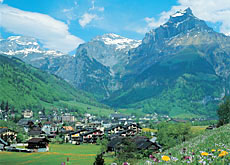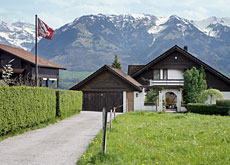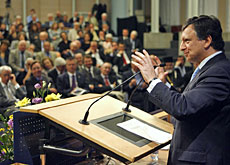Tax paradise leads Swiss company boom

A record number of firms set up shop in Switzerland in the first six months of this year, according to recent research.
Canton Obwalden, which drastically slashed corporate tax rates 18 months ago, registered the fastest growth while foreign relocations made up a growing share of the 18,635 new companies.
The record figures show an increase of 5.5 per cent in new company registrations from the corresponding period in 2006 according to a study by credit risk assessment company Dun & Bradstreet. The previous record was 17,622 in the first half of 2004.
At the same time, bankruptcies for the first six months of the year fell 4.3 per cent from the same period in 2006 to 2,252 according to official statistics.
Nearly one in three was of foreign origin (5,186), marking a 14.5% rise in firms choosing Switzerland to set up shop between January 1 and June 30.
German businesses led the way making up a fifth of the total, while Dutch companies moving in leapt by nearly a third.
Such statistics might fan the flames of a dispute with the European Union over “unfair” fiscal advantages that encourage European companies to relocate in Swiss tax paradises. The EU has been at loggerheads with the Swiss government over this issue with no end in sight.
Huge growth rate
Most companies (3,191) set up in the business hub of canton Zurich, but canton Obwalden saw a 230 per cent increase in new firms compared to the first half of 2006 – the highest growth rate in Switzerland.
Business has been booming in Obwalden since it cut its corporate tax rate to just 6.6 per cent at the beginning of 2006.
Knut Hackbarth, managing director of the relocation company Obwalden Business Promotion, told swissinfo that a tax policy designed to stop companies leaving the canton is paying bigger dividends than expected.
“We have had a huge growth rate since taxes were lowered with 30 or 40 new businesses per month [in the first year],” he said.
“As long as the current rate continues we could see 50 per cent more companies in the canton within two years of the tax changes.”
Court case publicity
The other part of Obwalden’s two-pronged fiscal offensive, a degressive income tax aimed at attracting wealthy residents, had to be scrapped after the Swiss Federal Court ruled it unconstitutional last month. But the high profile court case came with a silver lining, according to Hackbarth.
“It brought a lot of attention to Obwalden and gave us a lot of visibility that we would not normally have received,” he told swissinfo.
“This in turn has helped us attract more companies by putting us on their radar. We could never have afforded such publicity had we tried to generate it ourselves.”
However, Hackbarth stressed that Switzerland’s highly qualified workforce, excellent facilities, landscape and good standard of living are also a magnet for foreign firms.
“We have a popular ski resort in Engelberg where people have holiday homes. We have observed that some company owners are now relocating their companies to be near these homes. There is lot more flexibility about company location than there used to be,” he said.
swissinfo, Matthew Allen
Economic analysis institute BAK Basel Economics calculated earlier this month that companies in Obwalden have on average the lowest effective tax burden (federal, cantonal & communal) than anywhere in Switzerland.
Selected corporate tax rates by canton:
Obwalden: 11.5%
Zug: 13.7%
Nidwalden: 14.8%
Schwyz: 17%
Zurich: 18.3%
Basel Land (last place): 23.4%
Switzerland’s competitive tax system has come under the scrutiny of the European Commission, which questions whether tax breaks attracting foreign companies contravene the 1972 free-trade agreement.
The EU’s code of conduct forbids member states from luring foreign companies with lower taxes than those offered to domestic firms. Non-EU member Switzerland has not signed this code.
Switzerland is also convinced that the procedures for taxing management companies, mixed companies and holding companies in the country do not fall within the scope of the 1972 free trade agreement.
The dispute reached a stalemate some 18 months after the matter was first raised, but with more companies relocating to Switzerland, it is unlikely to go away.

In compliance with the JTI standards
More: SWI swissinfo.ch certified by the Journalism Trust Initiative



You can find an overview of ongoing debates with our journalists here . Please join us!
If you want to start a conversation about a topic raised in this article or want to report factual errors, email us at english@swissinfo.ch.